Personal and Professional Development Report: Hotel Industry Analysis
VerifiedAdded on 2020/12/09
|9
|2108
|128
Report
AI Summary
This report delves into personal and professional development within the context of the hotel industry. It begins by evaluating the author's skill set using Kolb's Model of Learning, identifying strengths such as communication, commitment, and management skills, while also recognizing areas for improvement like leadership and problem-solving. The report then outlines career ambitions within the hotel sector, including roles like Casino Property General Manager and Front Office Manager, and justifies these aspirations based on industry freedom, growth potential, and diverse opportunities. A key component of the report involves matching existing skills with desired career paths, highlighting the importance of skills like commitment and communication. Furthermore, it identifies skill gaps, such as the need for improved leadership and problem-solving abilities, and suggests recommendations for achieving objectives, including using the SMART model, seeking feedback, and breaking down goals into manageable tasks. The report concludes by emphasizing the interconnectedness of personal and professional development and the value of continuous learning and experience in shaping an individual's career trajectory.
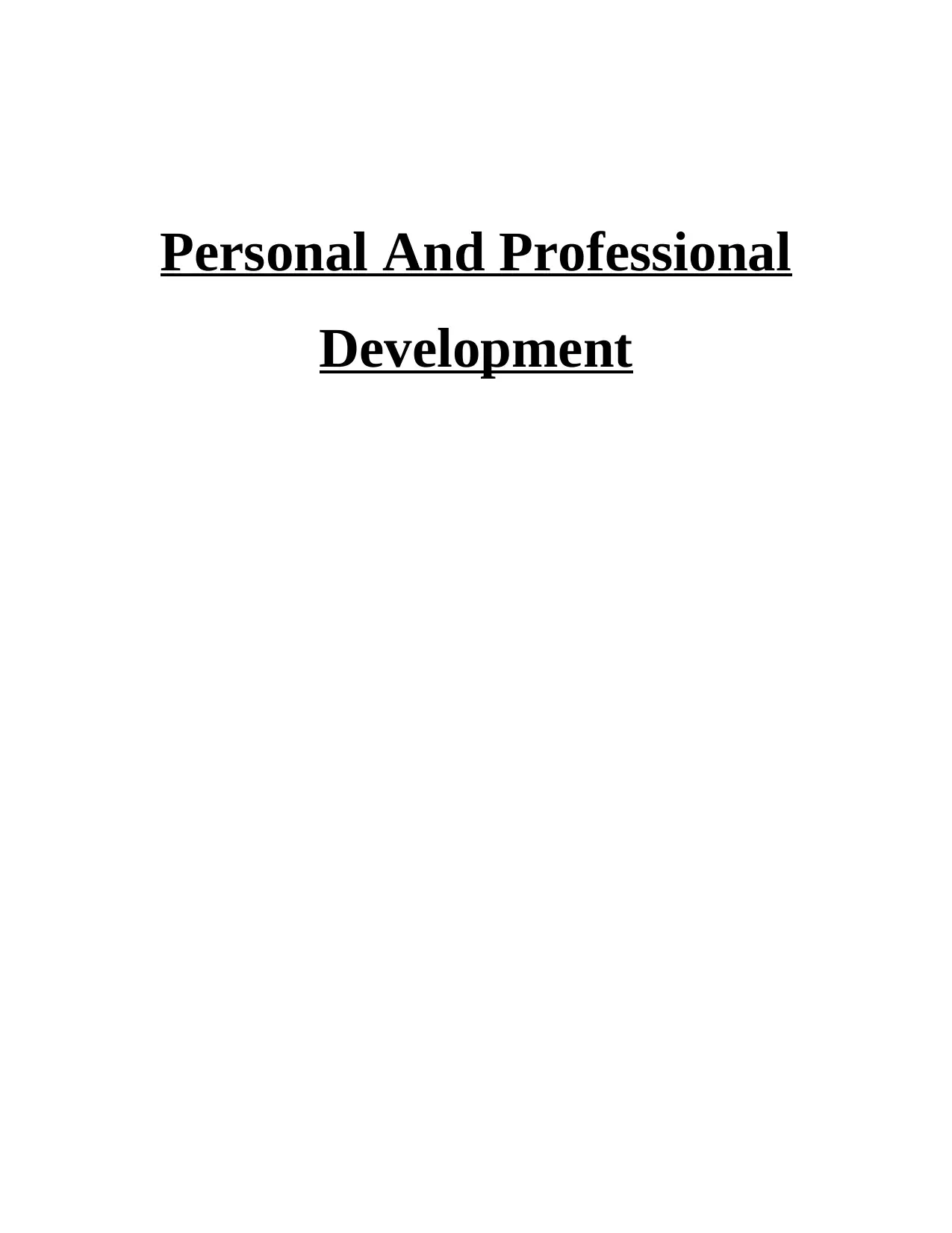
Personal And Professional
Development
Development
Paraphrase This Document
Need a fresh take? Get an instant paraphrase of this document with our AI Paraphraser
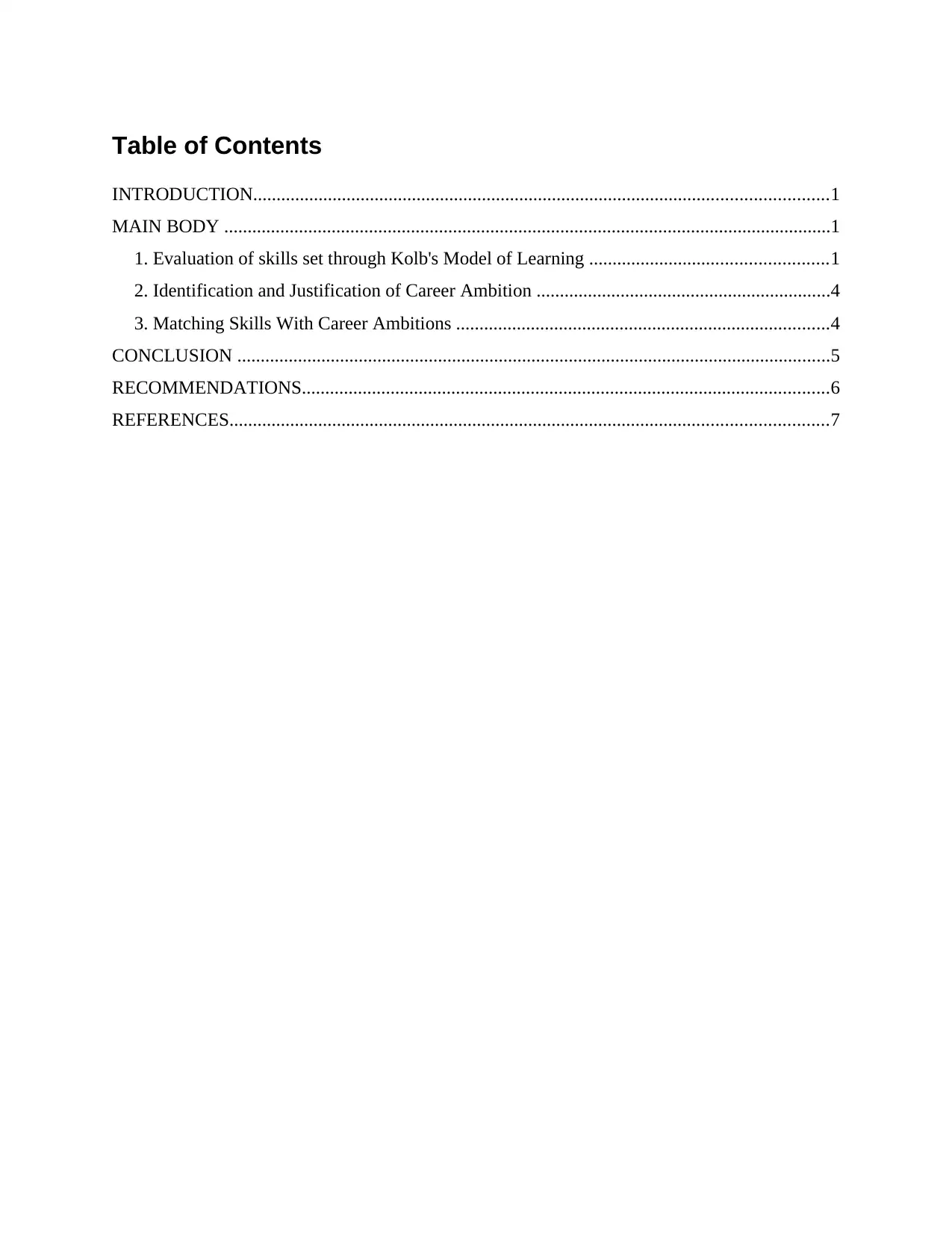
Table of Contents
INTRODUCTION...........................................................................................................................1
MAIN BODY ..................................................................................................................................1
1. Evaluation of skills set through Kolb's Model of Learning ...................................................1
2. Identification and Justification of Career Ambition ...............................................................4
3. Matching Skills With Career Ambitions ................................................................................4
CONCLUSION ...............................................................................................................................5
RECOMMENDATIONS.................................................................................................................6
REFERENCES................................................................................................................................7
INTRODUCTION...........................................................................................................................1
MAIN BODY ..................................................................................................................................1
1. Evaluation of skills set through Kolb's Model of Learning ...................................................1
2. Identification and Justification of Career Ambition ...............................................................4
3. Matching Skills With Career Ambitions ................................................................................4
CONCLUSION ...............................................................................................................................5
RECOMMENDATIONS.................................................................................................................6
REFERENCES................................................................................................................................7
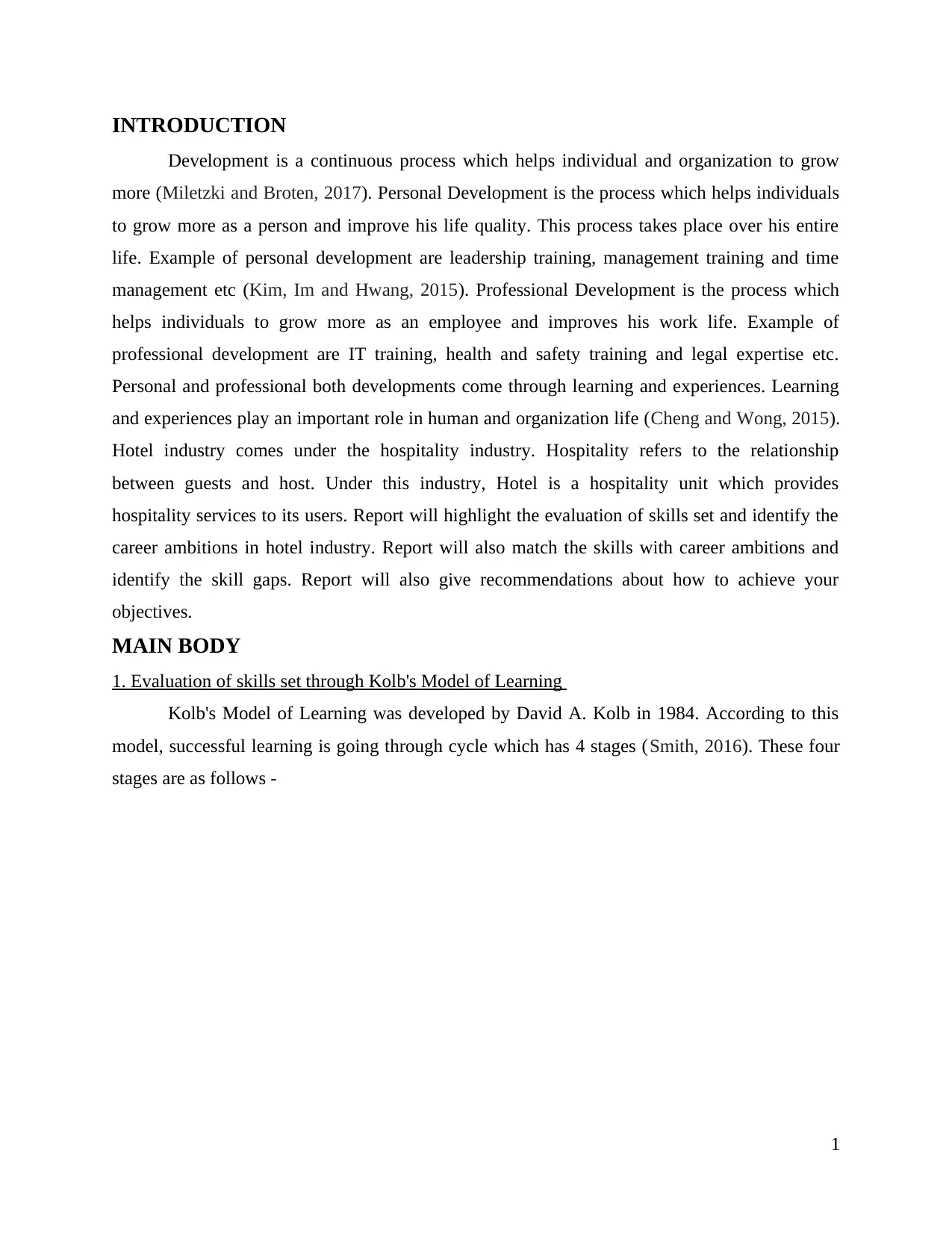
INTRODUCTION
Development is a continuous process which helps individual and organization to grow
more (Miletzki and Broten, 2017). Personal Development is the process which helps individuals
to grow more as a person and improve his life quality. This process takes place over his entire
life. Example of personal development are leadership training, management training and time
management etc (Kim, Im and Hwang, 2015). Professional Development is the process which
helps individuals to grow more as an employee and improves his work life. Example of
professional development are IT training, health and safety training and legal expertise etc.
Personal and professional both developments come through learning and experiences. Learning
and experiences play an important role in human and organization life (Cheng and Wong, 2015).
Hotel industry comes under the hospitality industry. Hospitality refers to the relationship
between guests and host. Under this industry, Hotel is a hospitality unit which provides
hospitality services to its users. Report will highlight the evaluation of skills set and identify the
career ambitions in hotel industry. Report will also match the skills with career ambitions and
identify the skill gaps. Report will also give recommendations about how to achieve your
objectives.
MAIN BODY
1. Evaluation of skills set through Kolb's Model of Learning
Kolb's Model of Learning was developed by David A. Kolb in 1984. According to this
model, successful learning is going through cycle which has 4 stages (Smith, 2016). These four
stages are as follows -
1
Development is a continuous process which helps individual and organization to grow
more (Miletzki and Broten, 2017). Personal Development is the process which helps individuals
to grow more as a person and improve his life quality. This process takes place over his entire
life. Example of personal development are leadership training, management training and time
management etc (Kim, Im and Hwang, 2015). Professional Development is the process which
helps individuals to grow more as an employee and improves his work life. Example of
professional development are IT training, health and safety training and legal expertise etc.
Personal and professional both developments come through learning and experiences. Learning
and experiences play an important role in human and organization life (Cheng and Wong, 2015).
Hotel industry comes under the hospitality industry. Hospitality refers to the relationship
between guests and host. Under this industry, Hotel is a hospitality unit which provides
hospitality services to its users. Report will highlight the evaluation of skills set and identify the
career ambitions in hotel industry. Report will also match the skills with career ambitions and
identify the skill gaps. Report will also give recommendations about how to achieve your
objectives.
MAIN BODY
1. Evaluation of skills set through Kolb's Model of Learning
Kolb's Model of Learning was developed by David A. Kolb in 1984. According to this
model, successful learning is going through cycle which has 4 stages (Smith, 2016). These four
stages are as follows -
1
⊘ This is a preview!⊘
Do you want full access?
Subscribe today to unlock all pages.

Trusted by 1+ million students worldwide
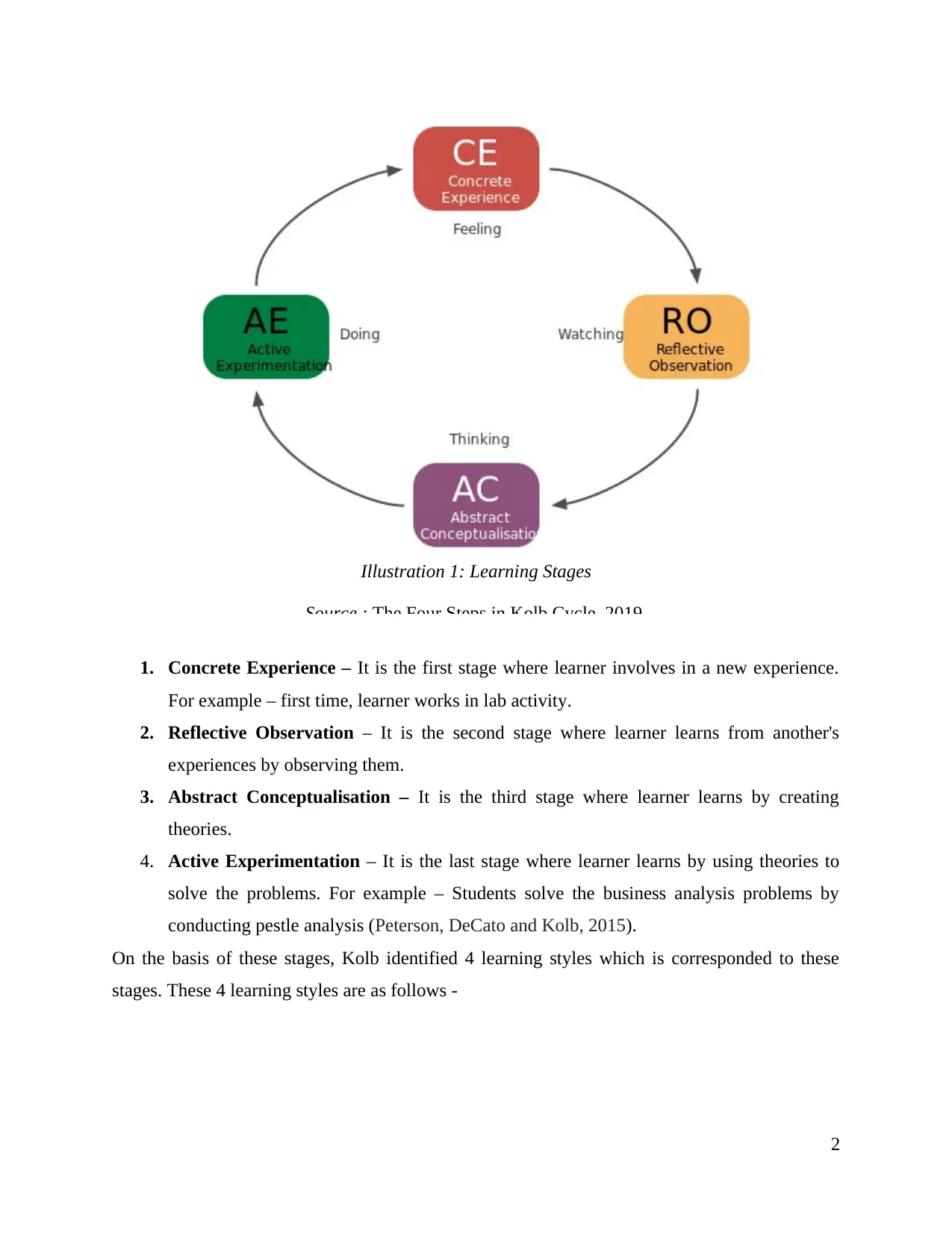
1. Concrete Experience – It is the first stage where learner involves in a new experience.
For example – first time, learner works in lab activity.
2. Reflective Observation – It is the second stage where learner learns from another's
experiences by observing them.
3. Abstract Conceptualisation – It is the third stage where learner learns by creating
theories.
4. Active Experimentation – It is the last stage where learner learns by using theories to
solve the problems. For example – Students solve the business analysis problems by
conducting pestle analysis (Peterson, DeCato and Kolb, 2015).
On the basis of these stages, Kolb identified 4 learning styles which is corresponded to these
stages. These 4 learning styles are as follows -
2
Illustration 1: Learning Stages
Source : The Four Steps in Kolb Cycle, 2019.
For example – first time, learner works in lab activity.
2. Reflective Observation – It is the second stage where learner learns from another's
experiences by observing them.
3. Abstract Conceptualisation – It is the third stage where learner learns by creating
theories.
4. Active Experimentation – It is the last stage where learner learns by using theories to
solve the problems. For example – Students solve the business analysis problems by
conducting pestle analysis (Peterson, DeCato and Kolb, 2015).
On the basis of these stages, Kolb identified 4 learning styles which is corresponded to these
stages. These 4 learning styles are as follows -
2
Illustration 1: Learning Stages
Source : The Four Steps in Kolb Cycle, 2019.
Paraphrase This Document
Need a fresh take? Get an instant paraphrase of this document with our AI Paraphraser
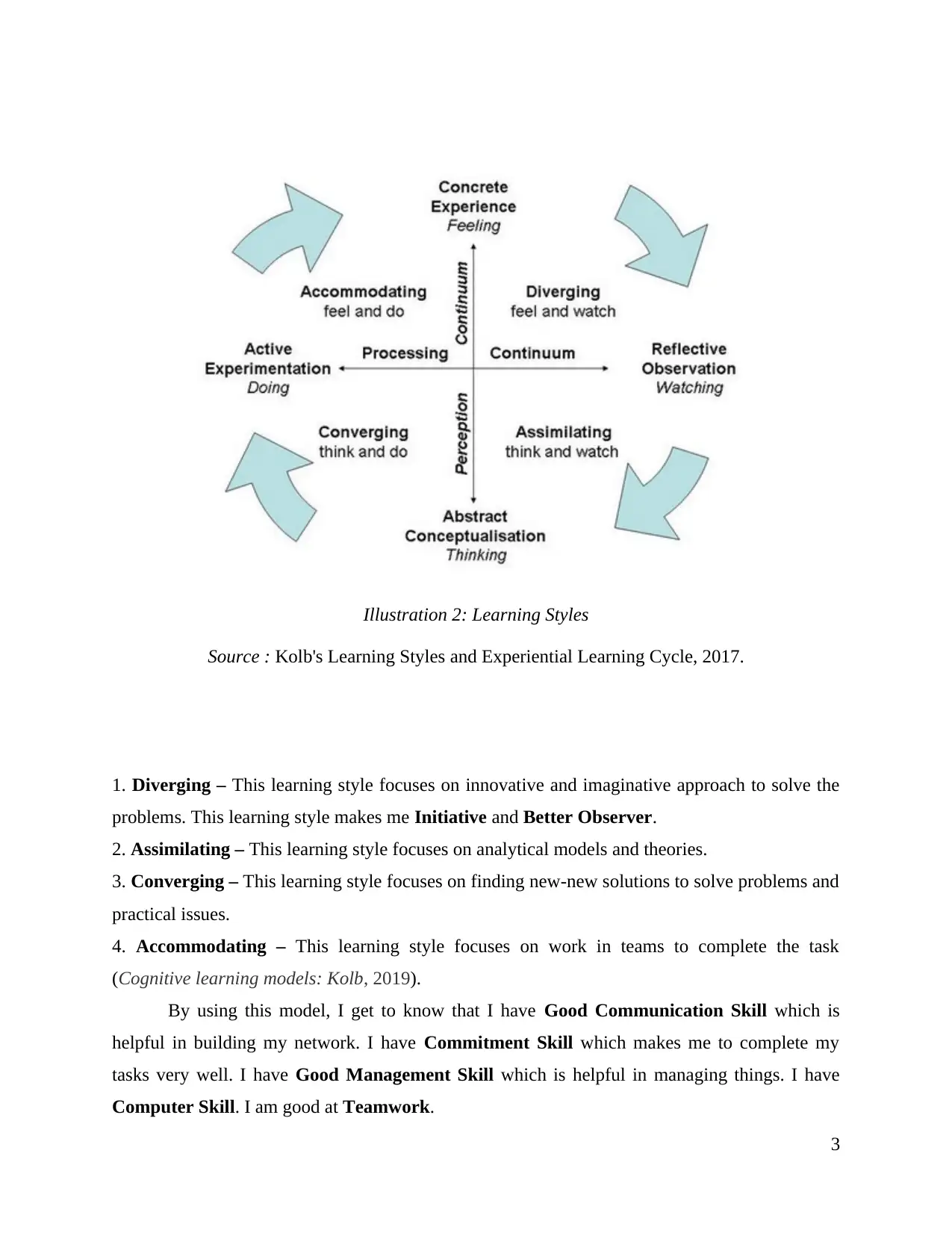
1. Diverging – This learning style focuses on innovative and imaginative approach to solve the
problems. This learning style makes me Initiative and Better Observer.
2. Assimilating – This learning style focuses on analytical models and theories.
3. Converging – This learning style focuses on finding new-new solutions to solve problems and
practical issues.
4. Accommodating – This learning style focuses on work in teams to complete the task
(Cognitive learning models: Kolb, 2019).
By using this model, I get to know that I have Good Communication Skill which is
helpful in building my network. I have Commitment Skill which makes me to complete my
tasks very well. I have Good Management Skill which is helpful in managing things. I have
Computer Skill. I am good at Teamwork.
3
Illustration 2: Learning Styles
Source : Kolb's Learning Styles and Experiential Learning Cycle, 2017.
problems. This learning style makes me Initiative and Better Observer.
2. Assimilating – This learning style focuses on analytical models and theories.
3. Converging – This learning style focuses on finding new-new solutions to solve problems and
practical issues.
4. Accommodating – This learning style focuses on work in teams to complete the task
(Cognitive learning models: Kolb, 2019).
By using this model, I get to know that I have Good Communication Skill which is
helpful in building my network. I have Commitment Skill which makes me to complete my
tasks very well. I have Good Management Skill which is helpful in managing things. I have
Computer Skill. I am good at Teamwork.
3
Illustration 2: Learning Styles
Source : Kolb's Learning Styles and Experiential Learning Cycle, 2017.
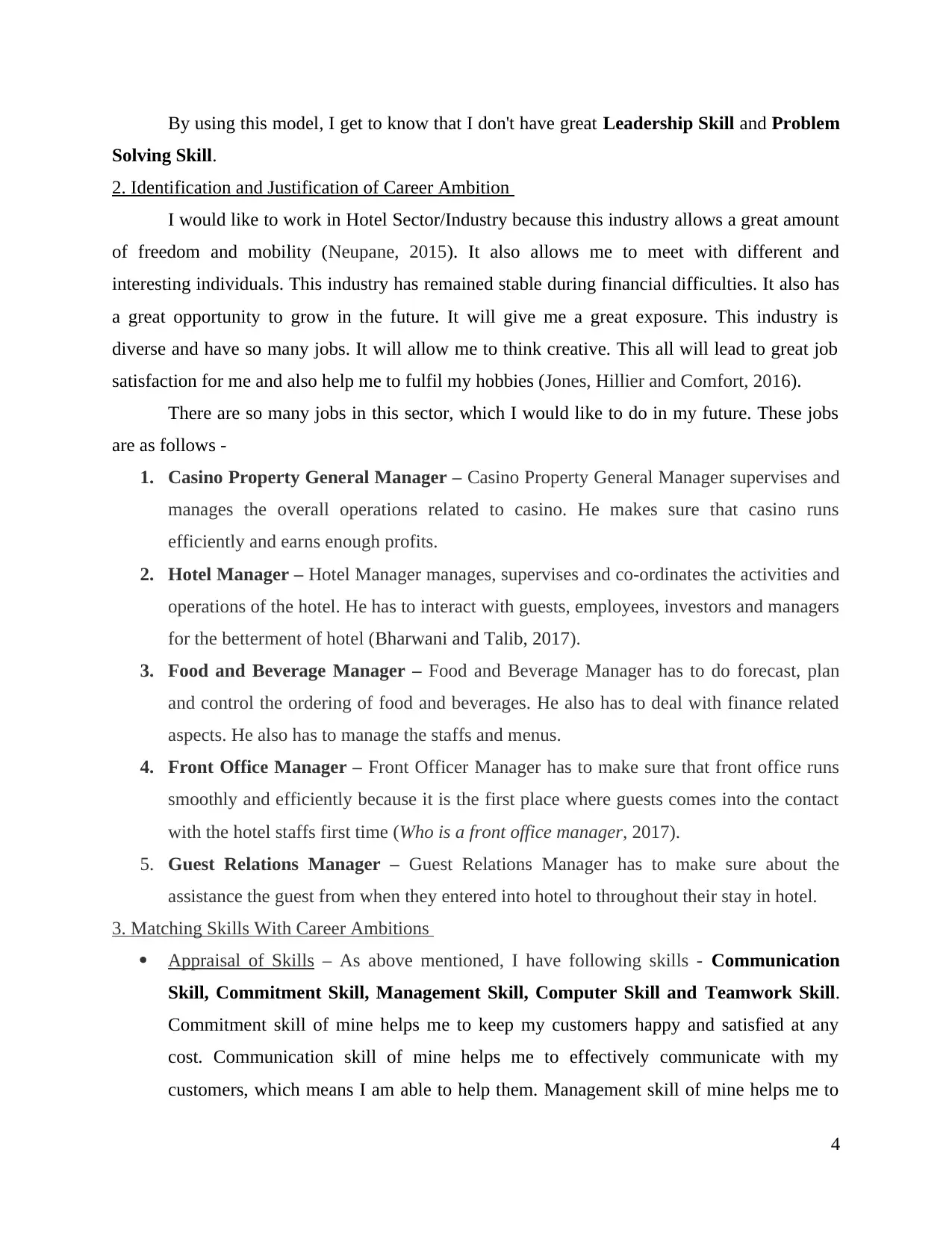
By using this model, I get to know that I don't have great Leadership Skill and Problem
Solving Skill.
2. Identification and Justification of Career Ambition
I would like to work in Hotel Sector/Industry because this industry allows a great amount
of freedom and mobility (Neupane, 2015). It also allows me to meet with different and
interesting individuals. This industry has remained stable during financial difficulties. It also has
a great opportunity to grow in the future. It will give me a great exposure. This industry is
diverse and have so many jobs. It will allow me to think creative. This all will lead to great job
satisfaction for me and also help me to fulfil my hobbies (Jones, Hillier and Comfort, 2016).
There are so many jobs in this sector, which I would like to do in my future. These jobs
are as follows -
1. Casino Property General Manager – Casino Property General Manager supervises and
manages the overall operations related to casino. He makes sure that casino runs
efficiently and earns enough profits.
2. Hotel Manager – Hotel Manager manages, supervises and co-ordinates the activities and
operations of the hotel. He has to interact with guests, employees, investors and managers
for the betterment of hotel (Bharwani and Talib, 2017).
3. Food and Beverage Manager – Food and Beverage Manager has to do forecast, plan
and control the ordering of food and beverages. He also has to deal with finance related
aspects. He also has to manage the staffs and menus.
4. Front Office Manager – Front Officer Manager has to make sure that front office runs
smoothly and efficiently because it is the first place where guests comes into the contact
with the hotel staffs first time (Who is a front office manager, 2017).
5. Guest Relations Manager – Guest Relations Manager has to make sure about the
assistance the guest from when they entered into hotel to throughout their stay in hotel.
3. Matching Skills With Career Ambitions
Appraisal of Skills – As above mentioned, I have following skills - Communication
Skill, Commitment Skill, Management Skill, Computer Skill and Teamwork Skill.
Commitment skill of mine helps me to keep my customers happy and satisfied at any
cost. Communication skill of mine helps me to effectively communicate with my
customers, which means I am able to help them. Management skill of mine helps me to
4
Solving Skill.
2. Identification and Justification of Career Ambition
I would like to work in Hotel Sector/Industry because this industry allows a great amount
of freedom and mobility (Neupane, 2015). It also allows me to meet with different and
interesting individuals. This industry has remained stable during financial difficulties. It also has
a great opportunity to grow in the future. It will give me a great exposure. This industry is
diverse and have so many jobs. It will allow me to think creative. This all will lead to great job
satisfaction for me and also help me to fulfil my hobbies (Jones, Hillier and Comfort, 2016).
There are so many jobs in this sector, which I would like to do in my future. These jobs
are as follows -
1. Casino Property General Manager – Casino Property General Manager supervises and
manages the overall operations related to casino. He makes sure that casino runs
efficiently and earns enough profits.
2. Hotel Manager – Hotel Manager manages, supervises and co-ordinates the activities and
operations of the hotel. He has to interact with guests, employees, investors and managers
for the betterment of hotel (Bharwani and Talib, 2017).
3. Food and Beverage Manager – Food and Beverage Manager has to do forecast, plan
and control the ordering of food and beverages. He also has to deal with finance related
aspects. He also has to manage the staffs and menus.
4. Front Office Manager – Front Officer Manager has to make sure that front office runs
smoothly and efficiently because it is the first place where guests comes into the contact
with the hotel staffs first time (Who is a front office manager, 2017).
5. Guest Relations Manager – Guest Relations Manager has to make sure about the
assistance the guest from when they entered into hotel to throughout their stay in hotel.
3. Matching Skills With Career Ambitions
Appraisal of Skills – As above mentioned, I have following skills - Communication
Skill, Commitment Skill, Management Skill, Computer Skill and Teamwork Skill.
Commitment skill of mine helps me to keep my customers happy and satisfied at any
cost. Communication skill of mine helps me to effectively communicate with my
customers, which means I am able to help them. Management skill of mine helps me to
4
⊘ This is a preview!⊘
Do you want full access?
Subscribe today to unlock all pages.

Trusted by 1+ million students worldwide
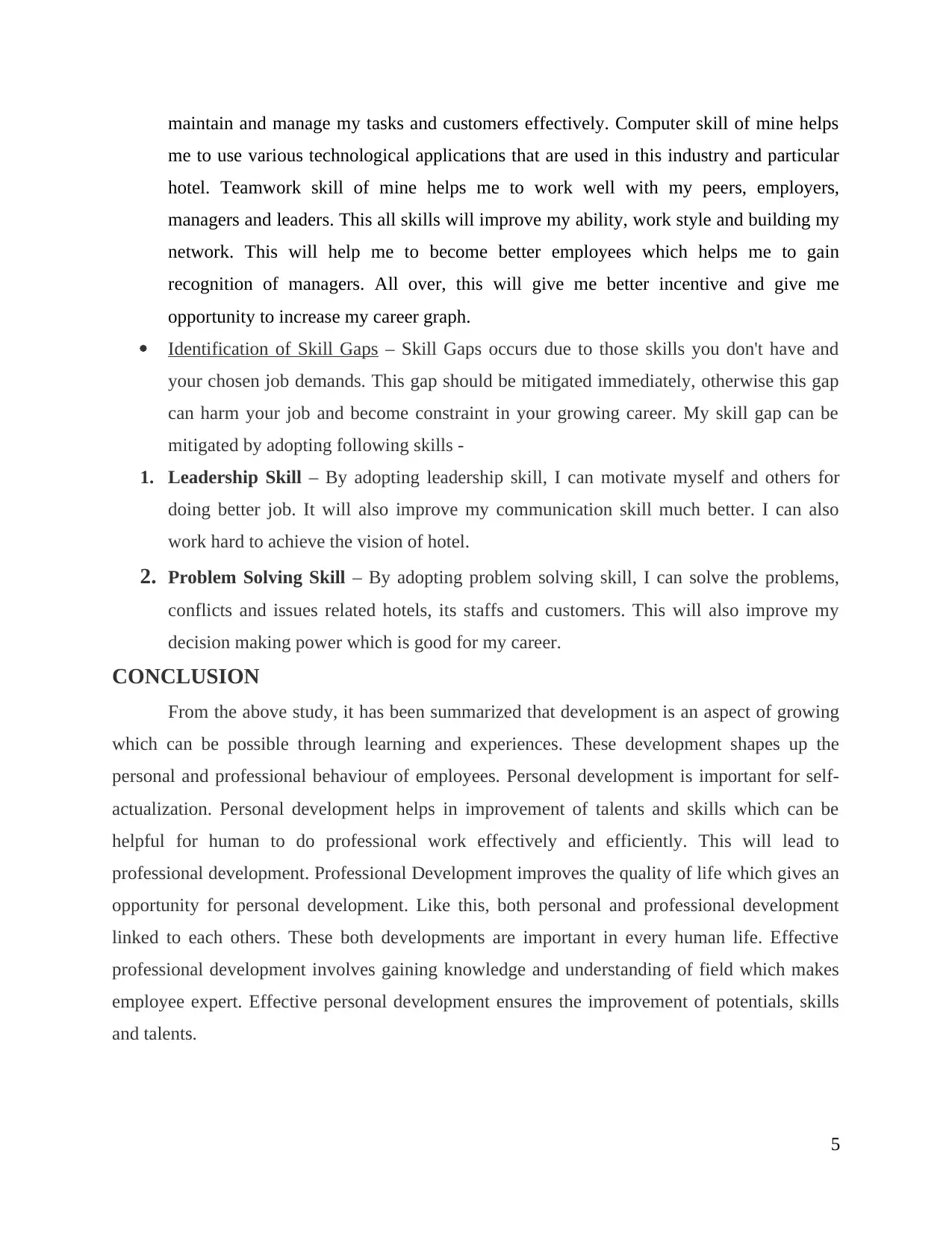
maintain and manage my tasks and customers effectively. Computer skill of mine helps
me to use various technological applications that are used in this industry and particular
hotel. Teamwork skill of mine helps me to work well with my peers, employers,
managers and leaders. This all skills will improve my ability, work style and building my
network. This will help me to become better employees which helps me to gain
recognition of managers. All over, this will give me better incentive and give me
opportunity to increase my career graph.
Identification of Skill Gaps – Skill Gaps occurs due to those skills you don't have and
your chosen job demands. This gap should be mitigated immediately, otherwise this gap
can harm your job and become constraint in your growing career. My skill gap can be
mitigated by adopting following skills -
1. Leadership Skill – By adopting leadership skill, I can motivate myself and others for
doing better job. It will also improve my communication skill much better. I can also
work hard to achieve the vision of hotel.
2. Problem Solving Skill – By adopting problem solving skill, I can solve the problems,
conflicts and issues related hotels, its staffs and customers. This will also improve my
decision making power which is good for my career.
CONCLUSION
From the above study, it has been summarized that development is an aspect of growing
which can be possible through learning and experiences. These development shapes up the
personal and professional behaviour of employees. Personal development is important for self-
actualization. Personal development helps in improvement of talents and skills which can be
helpful for human to do professional work effectively and efficiently. This will lead to
professional development. Professional Development improves the quality of life which gives an
opportunity for personal development. Like this, both personal and professional development
linked to each others. These both developments are important in every human life. Effective
professional development involves gaining knowledge and understanding of field which makes
employee expert. Effective personal development ensures the improvement of potentials, skills
and talents.
5
me to use various technological applications that are used in this industry and particular
hotel. Teamwork skill of mine helps me to work well with my peers, employers,
managers and leaders. This all skills will improve my ability, work style and building my
network. This will help me to become better employees which helps me to gain
recognition of managers. All over, this will give me better incentive and give me
opportunity to increase my career graph.
Identification of Skill Gaps – Skill Gaps occurs due to those skills you don't have and
your chosen job demands. This gap should be mitigated immediately, otherwise this gap
can harm your job and become constraint in your growing career. My skill gap can be
mitigated by adopting following skills -
1. Leadership Skill – By adopting leadership skill, I can motivate myself and others for
doing better job. It will also improve my communication skill much better. I can also
work hard to achieve the vision of hotel.
2. Problem Solving Skill – By adopting problem solving skill, I can solve the problems,
conflicts and issues related hotels, its staffs and customers. This will also improve my
decision making power which is good for my career.
CONCLUSION
From the above study, it has been summarized that development is an aspect of growing
which can be possible through learning and experiences. These development shapes up the
personal and professional behaviour of employees. Personal development is important for self-
actualization. Personal development helps in improvement of talents and skills which can be
helpful for human to do professional work effectively and efficiently. This will lead to
professional development. Professional Development improves the quality of life which gives an
opportunity for personal development. Like this, both personal and professional development
linked to each others. These both developments are important in every human life. Effective
professional development involves gaining knowledge and understanding of field which makes
employee expert. Effective personal development ensures the improvement of potentials, skills
and talents.
5
Paraphrase This Document
Need a fresh take? Get an instant paraphrase of this document with our AI Paraphraser
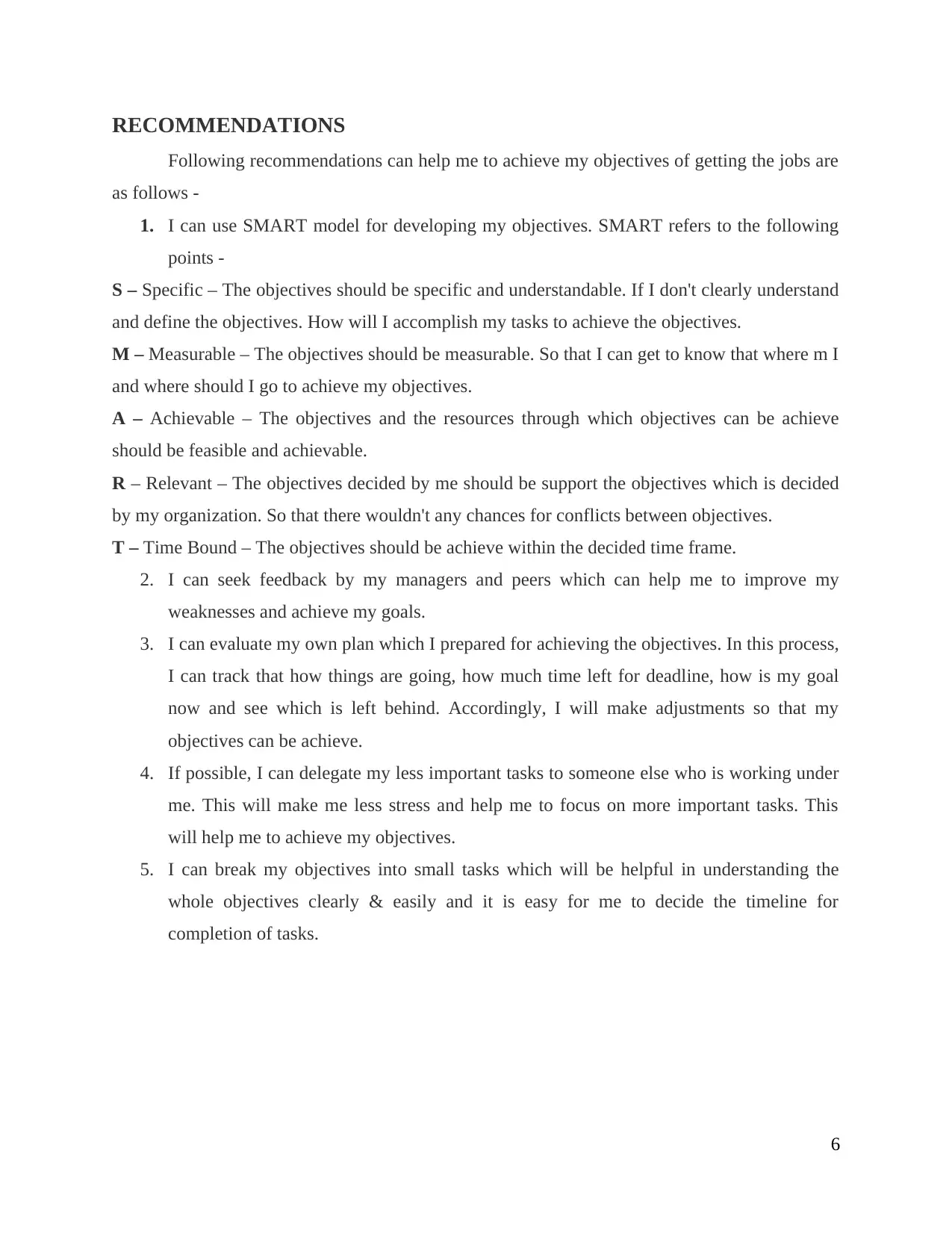
RECOMMENDATIONS
Following recommendations can help me to achieve my objectives of getting the jobs are
as follows -
1. I can use SMART model for developing my objectives. SMART refers to the following
points -
S – Specific – The objectives should be specific and understandable. If I don't clearly understand
and define the objectives. How will I accomplish my tasks to achieve the objectives.
M – Measurable – The objectives should be measurable. So that I can get to know that where m I
and where should I go to achieve my objectives.
A – Achievable – The objectives and the resources through which objectives can be achieve
should be feasible and achievable.
R – Relevant – The objectives decided by me should be support the objectives which is decided
by my organization. So that there wouldn't any chances for conflicts between objectives.
T – Time Bound – The objectives should be achieve within the decided time frame.
2. I can seek feedback by my managers and peers which can help me to improve my
weaknesses and achieve my goals.
3. I can evaluate my own plan which I prepared for achieving the objectives. In this process,
I can track that how things are going, how much time left for deadline, how is my goal
now and see which is left behind. Accordingly, I will make adjustments so that my
objectives can be achieve.
4. If possible, I can delegate my less important tasks to someone else who is working under
me. This will make me less stress and help me to focus on more important tasks. This
will help me to achieve my objectives.
5. I can break my objectives into small tasks which will be helpful in understanding the
whole objectives clearly & easily and it is easy for me to decide the timeline for
completion of tasks.
6
Following recommendations can help me to achieve my objectives of getting the jobs are
as follows -
1. I can use SMART model for developing my objectives. SMART refers to the following
points -
S – Specific – The objectives should be specific and understandable. If I don't clearly understand
and define the objectives. How will I accomplish my tasks to achieve the objectives.
M – Measurable – The objectives should be measurable. So that I can get to know that where m I
and where should I go to achieve my objectives.
A – Achievable – The objectives and the resources through which objectives can be achieve
should be feasible and achievable.
R – Relevant – The objectives decided by me should be support the objectives which is decided
by my organization. So that there wouldn't any chances for conflicts between objectives.
T – Time Bound – The objectives should be achieve within the decided time frame.
2. I can seek feedback by my managers and peers which can help me to improve my
weaknesses and achieve my goals.
3. I can evaluate my own plan which I prepared for achieving the objectives. In this process,
I can track that how things are going, how much time left for deadline, how is my goal
now and see which is left behind. Accordingly, I will make adjustments so that my
objectives can be achieve.
4. If possible, I can delegate my less important tasks to someone else who is working under
me. This will make me less stress and help me to focus on more important tasks. This
will help me to achieve my objectives.
5. I can break my objectives into small tasks which will be helpful in understanding the
whole objectives clearly & easily and it is easy for me to decide the timeline for
completion of tasks.
6
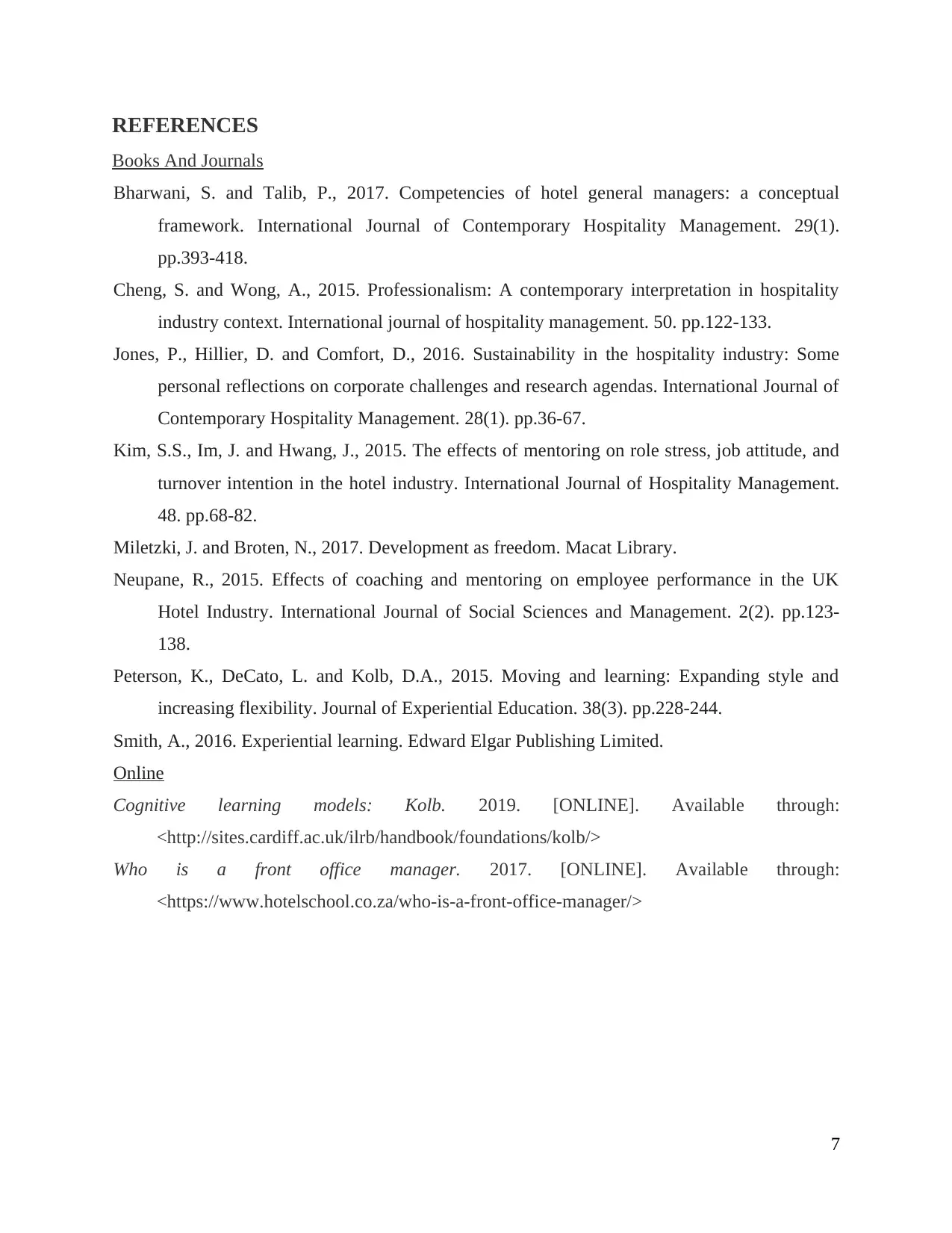
REFERENCES
Books And Journals
Bharwani, S. and Talib, P., 2017. Competencies of hotel general managers: a conceptual
framework. International Journal of Contemporary Hospitality Management. 29(1).
pp.393-418.
Cheng, S. and Wong, A., 2015. Professionalism: A contemporary interpretation in hospitality
industry context. International journal of hospitality management. 50. pp.122-133.
Jones, P., Hillier, D. and Comfort, D., 2016. Sustainability in the hospitality industry: Some
personal reflections on corporate challenges and research agendas. International Journal of
Contemporary Hospitality Management. 28(1). pp.36-67.
Kim, S.S., Im, J. and Hwang, J., 2015. The effects of mentoring on role stress, job attitude, and
turnover intention in the hotel industry. International Journal of Hospitality Management.
48. pp.68-82.
Miletzki, J. and Broten, N., 2017. Development as freedom. Macat Library.
Neupane, R., 2015. Effects of coaching and mentoring on employee performance in the UK
Hotel Industry. International Journal of Social Sciences and Management. 2(2). pp.123-
138.
Peterson, K., DeCato, L. and Kolb, D.A., 2015. Moving and learning: Expanding style and
increasing flexibility. Journal of Experiential Education. 38(3). pp.228-244.
Smith, A., 2016. Experiential learning. Edward Elgar Publishing Limited.
Online
Cognitive learning models: Kolb. 2019. [ONLINE]. Available through:
<http://sites.cardiff.ac.uk/ilrb/handbook/foundations/kolb/>
Who is a front office manager. 2017. [ONLINE]. Available through:
<https://www.hotelschool.co.za/who-is-a-front-office-manager/>
7
Books And Journals
Bharwani, S. and Talib, P., 2017. Competencies of hotel general managers: a conceptual
framework. International Journal of Contemporary Hospitality Management. 29(1).
pp.393-418.
Cheng, S. and Wong, A., 2015. Professionalism: A contemporary interpretation in hospitality
industry context. International journal of hospitality management. 50. pp.122-133.
Jones, P., Hillier, D. and Comfort, D., 2016. Sustainability in the hospitality industry: Some
personal reflections on corporate challenges and research agendas. International Journal of
Contemporary Hospitality Management. 28(1). pp.36-67.
Kim, S.S., Im, J. and Hwang, J., 2015. The effects of mentoring on role stress, job attitude, and
turnover intention in the hotel industry. International Journal of Hospitality Management.
48. pp.68-82.
Miletzki, J. and Broten, N., 2017. Development as freedom. Macat Library.
Neupane, R., 2015. Effects of coaching and mentoring on employee performance in the UK
Hotel Industry. International Journal of Social Sciences and Management. 2(2). pp.123-
138.
Peterson, K., DeCato, L. and Kolb, D.A., 2015. Moving and learning: Expanding style and
increasing flexibility. Journal of Experiential Education. 38(3). pp.228-244.
Smith, A., 2016. Experiential learning. Edward Elgar Publishing Limited.
Online
Cognitive learning models: Kolb. 2019. [ONLINE]. Available through:
<http://sites.cardiff.ac.uk/ilrb/handbook/foundations/kolb/>
Who is a front office manager. 2017. [ONLINE]. Available through:
<https://www.hotelschool.co.za/who-is-a-front-office-manager/>
7
⊘ This is a preview!⊘
Do you want full access?
Subscribe today to unlock all pages.

Trusted by 1+ million students worldwide
1 out of 9
Related Documents
Your All-in-One AI-Powered Toolkit for Academic Success.
+13062052269
info@desklib.com
Available 24*7 on WhatsApp / Email
![[object Object]](/_next/static/media/star-bottom.7253800d.svg)
Unlock your academic potential
Copyright © 2020–2026 A2Z Services. All Rights Reserved. Developed and managed by ZUCOL.



